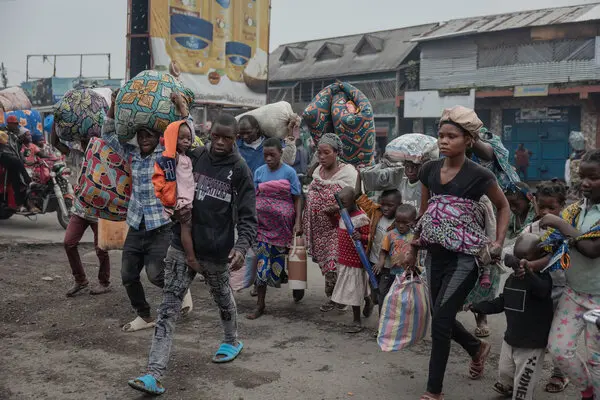
M23 rebels take control of Goma City, the Capital of North Kivu province in DR-Congo
The M23 rebel group announced early on Monday January 27 that it had captured the city of Goma, the largest in eastern Congo leading to widespread panic among its 2 million residents and prompted a swift condemnation from the Congolese government which labeled the advance as a “declaration of war.”
The rebels issued a statement urging Goma’s residents to remain calm while calling on Congolese military personnel to assemble at the central stadium. The rebel offensive is the latest escalation in one of Africa’s longest-running conflicts, which threatens to displace even more civilians in a region already plagued by instability.
According to a United Nations report, over one-third of North Kivu province’s population is currently displaced and the capture of Goma is likely to exacerbate this humanitarian crisis. As the situation unfolded, UN peacekeepers began processing members of the Congolese military who had surrendered on the city’s outskirts.
Congolese government spokesman, Patrick Muyaya released a video statement calling for civilian protection while acknowledging the precarious situation. He stated, “We are in a war situation where the news is changing.”
During an emergency meeting of the UN Security Council, the special representative for Congo conveyed that with Goma’s airport shut down and roads blocked, “we are trapped.” The UN’s presence in the region has been severely tested with significant casualties among peacekeepers in recent days.
Tensions escalated over the weekend as Congo severed diplomatic relations with Rwanda which it accuses of backing the M23 rebels. Rwanda, however, denies these claims although international experts have corroborated evidence of support. The on-going violence has already led to the deaths of at least 13 peacekeepers prompting urgent calls for a ceasefire from the international community including the United States and France.
In the backdrop, hundreds of Goma residents are fleeing as heavy gunfire echoes across the city. Many are seeking refuge in camps or attempting to cross into Rwanda for safety. Displaced individuals from the Kanyaruchinya camp reported chaotic scenes as they fled from perceived threats of violence.
“I heard that there are bombs in Goma too, so now we don’t know where to go,” lamented Adèle Shimiye, a displaced person anxious about their safety.
The situation remains fluid with fears that if the M23 rebels advance further into Goma, the humanitarian impact on civilians could be catastrophic. U.N. deputy humanitarian chief Joyce Msuya warned that hostilities spilling into the densely populated urban center could lead to devastating consequences for vulnerable populations.
As the Congolese army continues to resist the M23 offensive with support from allied forces including U.N. peacekeepers, the conflict raises grim reminders of previous confrontations, particularly Goma’s turbulent history including the M23’s prior capture in 2012. With tensions at a breaking point, residents like Bahati Jackson choose to remain, saying, “If we’re going to die, it’s better to die here.”
